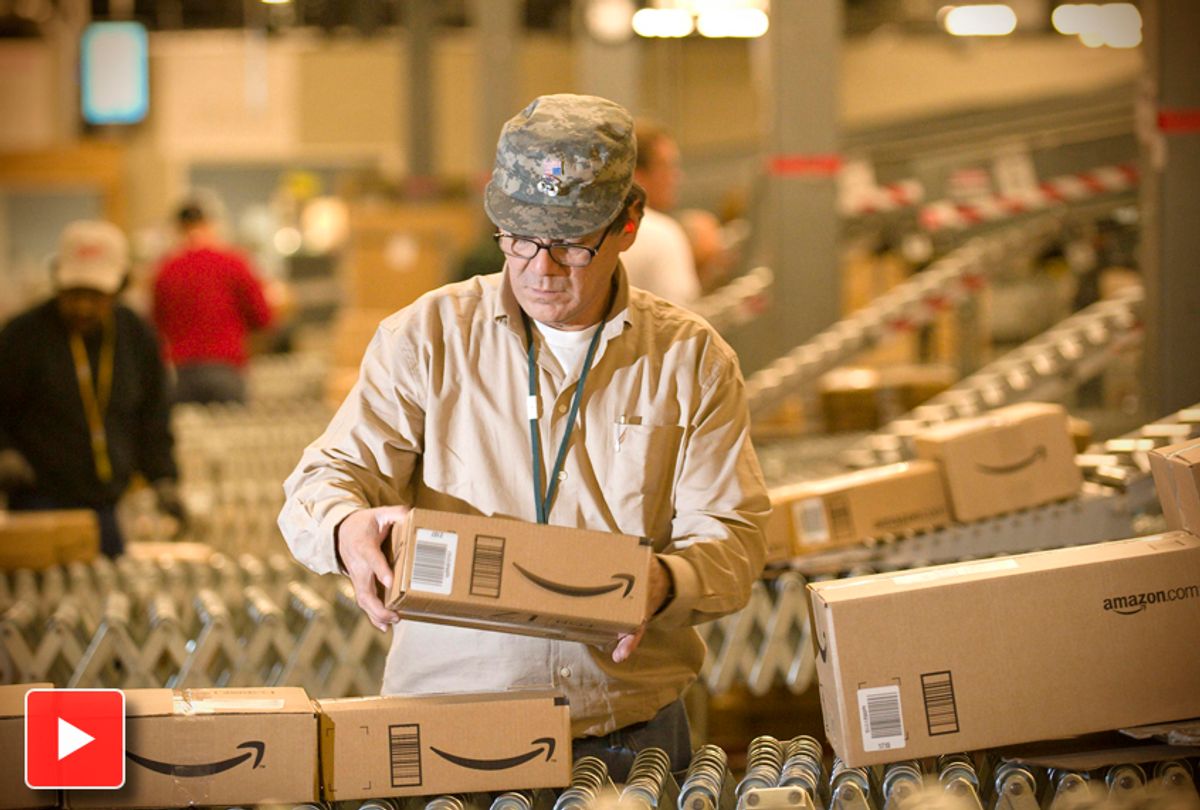In recent years, as Amazon has sought out cities and counties to house their fulfillment center warehouses — centers that store, pack and ship their products — the company has turned its search into a rah-rah marketing campaign.
“We’re proud to be creating jobs across America — this year alone we expect to create more than 40,000 full-time jobs," Amazon’s website states.
However, the Economic Policy Institute (EPI), an American think-tank which examines the economic impact of policies and proposals, found in a new report published Friday that counties that have Amazon fulfillment centers don't observe a boost in the local economy as promised.
That fact wouldn't be problematic if taxpayers in some cities weren’t paying for them. At the end of 2016, according to the report, Amazon had received an estimated $1 billion in state and local subsidies for its fulfillment warehouses, in exchange for “hundreds” of jobs with “higher” than “average” pay, supposedly. Hence, the EPI report suggests that the quid pro quo arrangement — tax breaks in exchange for an economic boost from Amazon's fulfillment centers — isn't working out for taxpayers.
“What we are finding is that, from the sample of fulfillment center openings we looked at, is that fulfillment centers that opened in counties in the last 15 years aren’t generating broader employment growth,” Ben Zipperer, an economist who worked on the study, told Salon. “The question to me is, ‘how much are you actually getting for the siting of a facility like this?’”
The report states that on average, two years after a warehouse opened its doors, overall private-sector employment didn’t increase in its host county. However, the report found the average host county does experience a 30 percent increase in overall local warehouse employment (a statistic that the study notes is “robust to statistical controls”).
“It is possible that the jobs created in the warehousing and storage sector are offset by job losses in other industries, or that the employment growth generated by Amazon is too small to meaningfully detect in the data,” the report states.
Spread out across the country, Amazon has an estimated 95 fulfillment centers in 25 states, according to data analyzed by the EPI — a big increase since 2011, when there were reportedly only 23 fulfillment centers in the country at the start of that year.
Data analyzed to measure employment in counties where fulfillment warehouses opened showed indications of small reduction in overall employment countywide, which further supports the EPI’s thesis that Amazon fulfillment warehouses don’t bring job growth.
Amazon boasts about its fulfillment centers, often claiming that they will bring thousands of jobs to a city or county. While they may create some jobs, it’s unlikely that they are making a significant impact on regional economies.
The report is timely, considering Amazon’s current search to house its second headquarters, known as HQ2. Though functionally different from its warehouse fulfillment centers, Amazon is conducting its host city search using similar tactics, promising up to 50,000 jobs and expecting massive tax breaks in return for their largesse. Cities around North America have responded by genuflecting at the company's door. Chicago offered to redirect 50 to 100 percent of Amazon employees' income taxes back to Amazon. Newark, New Jersey is reportedly offering Amazon up to $7 billion in tax breaks. Denver could give Amazon $100 million in incentives from a state fund, according to the Denver Post. Similarly, Philadelphia could give Amazon $1 billion in tax incentives.
Instead of luring Amazon warehouses, EPI suggests companies look to the transportation and education sectors.
“One tool proven particularly effective by research is public investment that increases the efficiency and attractiveness of local amenities such as transportation and the quality of local education,” the report states.
Good Jobs First, a national policy resource center (mentioned in the report) has been advocating for policymakers to stop offering Amazon subsidies — a recommendation that applies both to HQ2 and fulfillment centers.
“I recommend that public officials turn the table: when negotiating with Amazon, you should expect the company to pay for its arrival, not taxpayers,” executive director of Good Jobs First, Greg LeRoy, wrote.



Shares